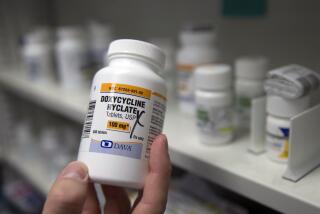Strides Made in Fighting HIV in Newborns
BARCELONA, Spain — In one of the great triumphs of the fight against AIDS, physicians have reduced the number of U.S. infants born with HIV infections by 80% since 1991, according to the latest estimates from the U.S. Centers for Disease Control and Prevention.
But experts cautioned Tuesday that the numbers could rise again without new prevention programs because the drugs being used are not 100% effective.
About 1,760 HIV-positive infants were born in the United States in 1991, but only an estimated 280 to 370 in 2000, Dr. Patricia Fleming of the CDC told the 14th International AIDS Conference.
That reduction, attributed to widespread treatment of pregnant women with anti-AIDS drugs, “clearly demonstrates remarkable progress,” said Dr. Harold Jaffe, who heads the CDC’s HIV prevention programs.
In general, only about 2% of infants born to HIV-positive women contract the virus if the mother is diagnosed before birth and receives a cocktail of anti-AIDS drugs.
If the mother receives no therapy, however, the transmission rate rockets to 25%.
Fleming’s study found that about 129,500 to 135,300 American women ages 13 through 44 were HIV positive in 2000, the most recent year for which figures are available. The comparable number in 1991 was 80,000.
The HIV-positive women gave birth to an estimated 6,075 to 6,422 infants in 2000. Based on the best statistical measures for the percentage of women treated and the transmission rate, Fleming’s group reached the new estimates.
Fleming cautioned that it would be difficult to get the numbers much lower because the treatment isn’t always effective. An estimated 120 to 130 HIV-positive babies still would have been born even if all the pregnant women had received treatment, she said.
The number of infected babies is likely to grow in the future because of the rise in new infections among women.
Fleming called for new prevention programs, saying, “The simple fact is that the best way to prevent new infections in babies is to prevent infections in women.”
Pregnant women in the rest of the world are not faring as well. In most developing countries, the only available treatment for pregnant women is a short course of the anti-AIDS drugs nevirapine or zidovudine shortly before birth, with perhaps a short treatment for the infant as well.
Very few women actually receive such treatment, however, and an estimated 5.1 million children worldwide have been born infected. The Bush administration recently announced that it was hoping to donate $200 million for next year to support such interventions.
One of the few successes at interrupting mother-to-infant transmission in developing nations is taking place in Thailand. Thai officials reported here this week that, in the first year of a new program, two-thirds of HIV-positive pregnant women received zidovudine from the 34th week of gestation until delivery.
Officials do not yet know how successful the program is, said Dr. Pornsinee Amornwichet of the Thai Ministry of Public Health, but pilot programs found that the regimen halved transmission.






